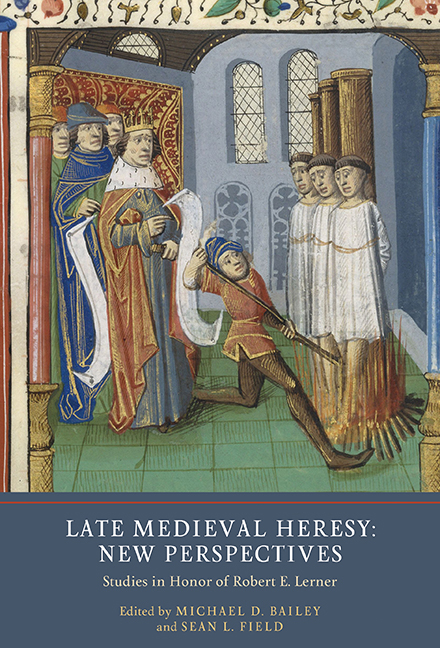Book contents
- Frontmatter
- Contents
- Preface: Robert E. Lerner: A Portrait
- List of Contributors
- Introduction: Historiography, Methodology, and Manuscripts: Robert E. Lerner and the Study of Late Medieval Heresy
- 1 The Heresy of the Templars and the Dream of a French Inquisition
- 2 The Dissemination of Barthélemy Sicard's Postilla super Danielem
- 3 Magic, Mysticism, and Heresy in the Early Fourteenth Century
- 4 The Making of a Heretic: Pope John XXII's Campaign against Louis of Bavaria
- 5 Unusual Choices: The Unique Heresy of Limoux Negre
- 6 Princely Poverty: Louis of Durazzo, Dynastic Politics, and Heresy in Fourteenth-Century Naples
- 7 Disentangling Heretics, Jews, and Muslims: Imagining Infidels in Late Medieval Pastoral Manuals
- 8 New Frontiers in the Late Medieval Reception of a Heretical Text: The Implications of Two New Latin Copies of Marguerite Porete's Mirror of Simple Souls
- 9 Disputing Prophetic Thought: The 1466 Questio quodlibetalis of Johannes of Dorsten
- 10 Heretics, Allies, Exemplary Christians: Latin Views of Ethiopian Orthodox in the Late Middle Ages
- 11 ‘By them in reality I meant the Jews’: Medieval Heretics in the Work and Life of Renate Riemeck (1920–2003)
- Afterword: Who or What Was a Heretic in the Late Middle Ages?
- Robert E. Lerner: A Chronological Bibliography
- Index
- York Medieval Press: Publications
Introduction: Historiography, Methodology, and Manuscripts: Robert E. Lerner and the Study of Late Medieval Heresy
Published online by Cambridge University Press: 14 June 2019
- Frontmatter
- Contents
- Preface: Robert E. Lerner: A Portrait
- List of Contributors
- Introduction: Historiography, Methodology, and Manuscripts: Robert E. Lerner and the Study of Late Medieval Heresy
- 1 The Heresy of the Templars and the Dream of a French Inquisition
- 2 The Dissemination of Barthélemy Sicard's Postilla super Danielem
- 3 Magic, Mysticism, and Heresy in the Early Fourteenth Century
- 4 The Making of a Heretic: Pope John XXII's Campaign against Louis of Bavaria
- 5 Unusual Choices: The Unique Heresy of Limoux Negre
- 6 Princely Poverty: Louis of Durazzo, Dynastic Politics, and Heresy in Fourteenth-Century Naples
- 7 Disentangling Heretics, Jews, and Muslims: Imagining Infidels in Late Medieval Pastoral Manuals
- 8 New Frontiers in the Late Medieval Reception of a Heretical Text: The Implications of Two New Latin Copies of Marguerite Porete's Mirror of Simple Souls
- 9 Disputing Prophetic Thought: The 1466 Questio quodlibetalis of Johannes of Dorsten
- 10 Heretics, Allies, Exemplary Christians: Latin Views of Ethiopian Orthodox in the Late Middle Ages
- 11 ‘By them in reality I meant the Jews’: Medieval Heretics in the Work and Life of Renate Riemeck (1920–2003)
- Afterword: Who or What Was a Heretic in the Late Middle Ages?
- Robert E. Lerner: A Chronological Bibliography
- Index
- York Medieval Press: Publications
Summary
For a millennium heresy has been central to ‘the making of European culture’. Indeed, claims for its centrality could be pushed back to well before the year 1000, to the Nicene Council and even earlier debates around the nature of Christian orthodoxy. But the formative battles of the Roman period were long past by the eleventh century when western Europe began its economic, demographic, and intellectual ‘leap’ forward toward the modern world. From the Gregorian reforms to the Protestant Reformation and beyond, heresies and heretics helped to shape the religious, political, and institutional structures that medieval Europe would bequeath to the modern West. Within this sweeping history, the late medieval period, traditionally understood as the fourteenth and fifteenth centuries, presents a particularly diverse array of heterodox movements and modes of thought. Yet despite this richness, or perhaps because of it, some of the most intriguing heresies and heretics from this era of ‘paradox, tension, and unpredictability’ have been undervalued in wider studies, treated either as epilogues to the better-studied twelfth and thirteenth centuries or as preludes to the epoch-making religious revolutions of the sixteenth.
This introduction first addresses the historiographic landscape of medieval heresy, focusing in particular on periodization and its consequences. Then, as befitting a collection honoring the pioneering work of Robert E. Lerner, it outlines the elements of a ‘Lernerian’ approach to late medieval heresy and suggests ways in which this approach informs the new perspectives presented here.
The Historiographic Landscape
The work of the German historian Herbert Grundmann (1902–70) has profoundly influenced scholars of medieval religious history, including – as Richard Kieckhefer's preface notes – Robert Lerner. For the field as a whole, Grundmann's most influential work was undoubtedly his brilliant 1935 study of Religiöse Bewegungen im Mittelalter, which analyzed ways in which groups that cohered around spiritual, intellectual, and cultural ideals shared by broad swathes of European society could still end up forced into dissent or at least labeled as dissidents. In this analysis, a figure such as Valdes of Lyon partook in the apostolic impulses that animated many twelfth-century figures, but when his refusal to abandon lay preaching led to condemnation, he and his followers were labeled as heretics, and many ultimately came to understand themselves as opponents of the organized Church.
- Type
- Chapter
- Information
- Late Medieval Heresy: New PerspectivesStudies in Honor of Robert E. Lerner, pp. 1 - 13Publisher: Boydell & BrewerPrint publication year: 2018

